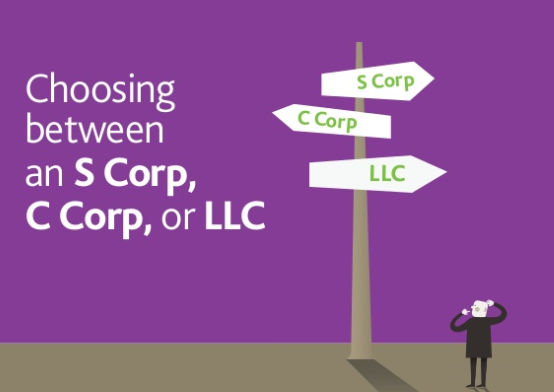Which Business Entity Is Right For My Business?

By Debbie Gregory.
Whether you are just starting a business or thinking of changing your business structure, a common first step is comparing the types of business structures. While a Limited Liability Company, a C Corporation and an S Corporation share some characteristics, they also have distinct differences. You should spend the time getting familiar with each type before deciding which one might be right for you.
Most small businesses are usually either a sole proprietorship or simple partnership. In both of these cases, the business taxes are part of the individual’s taxes. There are three major types of business entities that classify the business as its own “person”– a C Corporation, an S Corporation, and an LLC (Limited Liability Company).
Some business and certain tax rules are unique to the type of entity that you choose for your business. Read below for more information on each and always check with your accountant.
C Corporations
A C Corporation is taxed at a flat 21% regardless of how much business they conduct or money they make. Additionally, C Corporations help create personal liability protection for the owners of the business. They are designated to the public with extensions such as inc, corp, or ltd.
This type of corporation can issue stocks that when held for more than five years, they entitle the seller to tax-free gains. Raising capital is also very easy for a C Corporation as compared to the other business types because they issue stock in exchange for the funds raised.
The major downside to a C Corporation is double taxation. All business earnings are taxed and paid for by the business however, the income received by the business owners is not deductible and they must claim and pay income taxes on the salary they take from the business on their personal taxes.
C Corporations are separate taxpaying entities and file their own very specific tax forms every year to the IRS. These C Corporations can actually choose to be taxed as an S Corporation to help offset the double taxation by utilizing income pass-through to the owners, so they report their share on their personal taxes. This way the business and the business owners pay between 10 and 37% depending on the individual.
S Corporations
S Corporations also help create personal liability protection for the owners of the business. They are designated to the public with extensions such as inc, corp, or ltd – the same as C Corporations. An S Corporation also has the ability to allow up to 20% total business income deductions.
S Corporations are required by law to adopt and maintain certain formalities and they have extensive rules in place for how the business can be managed. They include by-laws, operating agreements, issuing stocks, membership shares, holding director and shareholder meetings, keeping meeting minutes and other extensive records.
LLC (Limited Liability Company)
An LLC has many advantages for business owners. As an LLC, you can elect to be taxed at the flat C Corporation rate, which can be very beneficial if the business owner is not qualified to use certain income deductions. This type of business entity also helps you avoid the double taxation issue of the C Corporation as the LLC is taxed a lot more like a sole proprietorship. This type of business also provides you good liability protection and some pass-through taxation, just like the C and S Corporations.
Another benefit of the LLC structure to a startup is that once you have set it up, there is not any need for continual maintenance. It is also easy to add new partners or sell interest in the entity to someone else. An LLC can have an unlimited number of members whereas S or C Corporations can only have a maximum of 100.
The downside to an LLC is that there is a minimum tax regardless of how much business you conduct. If you make zero dollars or ten thousand dollars you still owe that minimum tax.
The choice of business entity is a complex matter and you need to take into consideration both state and federal tax matters as well as any other issues and non-tax considerations (personal liability protection, raising capital, etc.). As with any major changes to the overall structure of your business, as well as the tax implications of any changes, we highly recommend consulting a tax, financial, and/or business professional before making any changes.










